Thought Leadership Studio Podcast Episodes:
Social Media Magic with the Tweeting Goddess Samantha Kelly
Episode 70 - Harnessing the Power of Authenticity and Community: Insights from Samantha Kelly on Building Influence and Positive Change Through Social Media
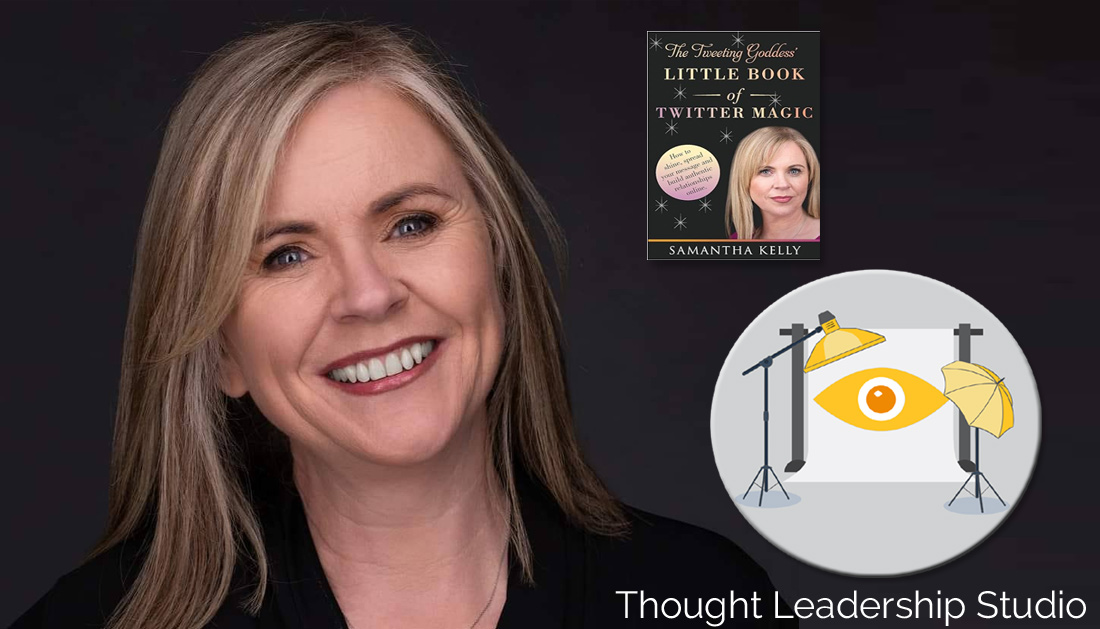
#communication, #entrepreneurship, #influencermarketing, #interviews, #marketing, #marketingstrategy, #personalbranding, #socialentrepreneurship, #socialmedia, #storytelling, #thoughtleadership, #thoughtleadershipexamples
Or Click here to listen or subscribe on appWhat this episode will do for you
:- Samantha Kelly's Social Media Transformation: Uncover Samantha's journey from facing personal challenges to becoming the Tweeting Goddess, highlighting her path through entrepreneurship and social media mastery.
- The Power of Authentic Connections: Understand the importance of authenticity and empathy in social media, and how these values can transcend digital boundaries to create real-world relationships.
- Strategies for Meaningful Engagement: Gain insights into effective social media engagement that resonates with audiences, encouraging interaction and building brand loyalty.
- Leveraging Social Media for Social Good: Explore how Samantha uses her social media influence to support causes, drive charitable efforts, and inspire positive change through digital platforms.
- Empowering Others Through Social Media: Find out how Samantha empowers other businesses and individuals to harness the potential of social media, turning followers into brand advocates and silent cheerleaders.
Samantha Kelly, The "Tweeting Goddess"
In this episode, I interview Samantha Kelly, also known as the "Tweeting Goddess," about her journey as a social media influencer and entrepreneur.
From starting her business, Funky Goddess, out of a personal need, to becoming a leading social media influencer, Samantha's journey is a testament to the power of authenticity, empathy, and storytelling in building a brand and fostering community.
Samantha shares her insights on the importance of genuine engagement, the role of social media in driving social change, and tips for entrepreneurs on enhancing their online presence. Her story is not just about personal success but about using social media to empower and give back to others.
Join us as the Tweeting Goddess herself offers valuable lessons on leveraging social media to connect deeply with your audience and make a meaningful impact. Whether you're looking to improve your social media strategy or be inspired by a powerful journey of transformation, this episode has something for everyone.
Some of Samantha's coordinates:
Curated Transcript of Interview with Samantha Kelly
The following partial transcript is lightly edited for clarity - the full interview is on audio. Click here to listen.
Chris McNeil: I'm Chris McNeil, with Thought Leadership Studio, and I'm sitting Chris here across an ocean from the tweeting goddess, Samantha Kelly, who's an X and LinkedIn audio host, business consultant, brand ambassador for Virgin Business. And really a fantastic example of the power of social media. And I should mention an author too. I just ordered her book from Amazon.
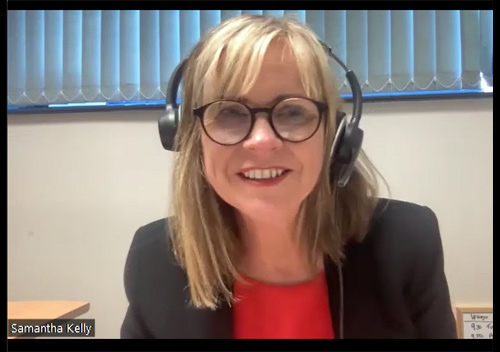 Samantha Kelly: Oh, thank you.
Samantha Kelly: Oh, thank you.
Chris McNeil: You're absolutely welcome, Samantha. Great to have you here.
Samantha Kelly: Oh, thank you so much. It's my pleasure and it's my favorite topic, and I just love helping people to understand the power of social media for good.
The Making of a Social Media Maven: Lessons in Authenticity and Connection
Chris McNeil: Maybe there's one listener out there who's not already familiar with you, so just in case, can you start with giving us a little background about what happened to get you to where you are now as the Tweeting Goddess, social media mogul and brand ambassador?
Samantha Kelly: Well, I was a lone parent on social welfare. I have two girls, and I was kind of coming to that stage. I was hitting 40 and I was kind of thinking about my life in general and stuff like that. My marriage had just broken up, and my daughter, who actually has hearing issues, she wears two hearing aids. She was about to start mainstream school. So I had been kind of caring for her and bringing her to appointments and speech therapy and all that kind of stuff.
So what happened was my other daughter was 11 at the time, and she came to that awkward milestone of the first period. So even people listening are probably going, did she say the word, period? So it was just like, I just felt sorry for her. So I went to the shop to get her a starter kit,
 And there were none. There were no starter sets for girls. So as a girl, anyone who's a female will understand, or dads of girls will understand, or people have sisters. It is one of those natural things in life, but that nobody talks about. So I decided there, and then my dad had actually just passed away as well. So I was going through a bit of grief and I decided, you know what? But I think he actually gave me the idea up in heaven.
And there were none. There were no starter sets for girls. So as a girl, anyone who's a female will understand, or dads of girls will understand, or people have sisters. It is one of those natural things in life, but that nobody talks about. So I decided there, and then my dad had actually just passed away as well. So I was going through a bit of grief and I decided, you know what? But I think he actually gave me the idea up in heaven.
But I said, you know what? I'm going to start a business. I had no money, I had no business experience, I had no social. I barely had a Facebook page, but I decided there and then that I was going to do this. So I created a gift box called Funky Goddess. So that's where my journey started because I had to learn how to market my business because I had no marketing budget.
So I had to do it all myself. And as most small business owners will know and entrepreneurs, you have to learn all these things to get better and better and better and to compete against the big guys. So I found to my delight, especially on Twitter, that I was a natural and I knew how to connect with people.
And because of the industry that I was in wellness and the facts of life and all of that, it taught me so much because I taught, for example, I taught my target customers were going to be moms. My biggest customers were men, lone fathers separated fathers. So they were thinking about if their daughter comes for the weekend or whatever on visitation or whatever, that they'd have something there in case the poor girl happened when she was with her dad instead of with her mom or whatever.
So it was funny. So I learned a lot. So that's how I learned about business and running a business. But my profile really shut up when I ended up on a show, it's like Shark Tank that show Shark Tank. I ended up on a show like that here in Ireland. I'm having to pitch to investors, I dunno if you've seen that, Chris, I must actually send it to you, but it's on YouTube.
And what happened was, because my dad had just passed away myself and my dad used to watch it all the time. He loved this show. He was always trying to think of something that would make us millionaires. He was a painter in decorator. And when I was getting my makeup done, a butterfly landed on the makeup Girl's Light, and she was like, why is there a butterfly here in January? And I said, I've asked my dad.
So on the show, it was great TV of course, because I burst into tears on the show because of all the emotion and the nerves, and I really needed this investment. And so that's really where the whole thing kind of took off because people, it made me realize, I thought, oh God, it was recorded. I thought, oh no, everyone's going to think I'm an idiot. I'm trying to be this business woman. And then I burst into tears and blah, blah, blah. But you know what? Twitter went crazy.
Everybody could identify with losing somebody close to you with the whole story. They loved the story. So that's where I saw the importance of storytelling and the importance of empathy and compassion and all of those lovely things and kindness and the amount of messages I got. And that's when I realized authenticity. I was being myself and that one being myself.
So on the show, I got investment afterwards. I didn't after due diligence and stuff, but it taught me so much because I realized the power of kindness and caring. Even one of the guys, one of the investors said, I can see the caring. So it was really, really cool. So that kind of is where it all started.
That's where people, I started getting interviewed by lots of people and stuff on the tv. So I sold that business since, because one day there was a hotel down the road here in Ireland and in Wexford, and they said, oh, can you teach us this Twitter thing? You seem to be really good at it. And I was like, yeah, sure. So I sat down and I taught them, and then they went, what will you just do it for us? And so I said, okay. And then I went, oh, that's a new business.
So that's when Tweeting Goddess was born. So my gift box was called Funky Goddess, and then I just switched my name to Tweeting Goddess, and that's where Tweeting Goddess came from. Yeah, that was the start. That was my first customer. What happened was the head office rang the hotel and said, how have your clicks gone up 15%? Your clicks to sale gone up 15%. And they went, oh, that's Samantha's running. So it was really good to see that I actually was getting them results as well.
Humanizing Your Brand: The Power of Authenticity and Empathy in Social Media
Chris McNeil: That's awesome. And I love how you went right to immutable values like empathy, being authentic and things that cut across cultural boundaries and impact us all as humans, things that come across media and the amplification, but the authenticity you bring to an amplification. I think a lot of people miss that.
And someone recently gave me the analogy of it's like hiding behind a logo where you don't let your person come through social media, but you try to make it a business just purely a business branding thing, but without the human empathy, human connection, the vulnerability component. And that still seems to be a phenomenon. People miss it everywhere.
What would you say to someone who's thinking about getting better at social media who maybe hasn't quite let themselves be human and vulnerable across those channels like that?
Samantha Kelly: Well go with what you're comfortable with. It depends on the channel you're using as well. I remember people saying to me, oh God, that LinkedIn, it's, it's so businessy. But I remember one day I put up a picture of my daughter playing soccer, and it was a really good picture that a photographer had taken and I said, this is why I do what I do. And that was the post, and it was the best post I ever did on LinkedIn because the amount of people who actually got it.
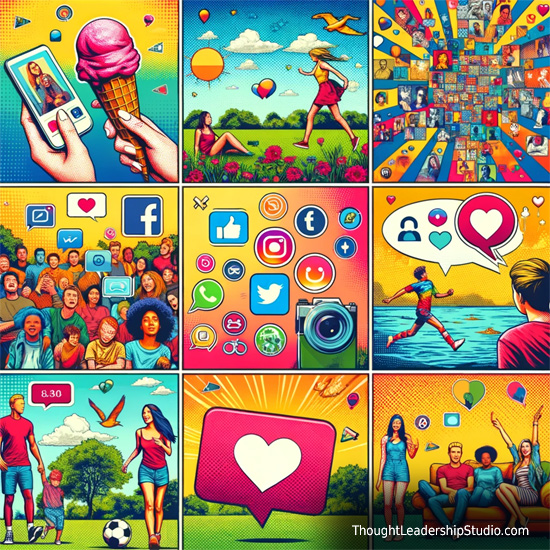 So it's about resonating. If your audience, let's say your target customer is someone who is struggling for time, talk about your own struggles with time. I mean, you're not a robot. I'm not a robot for sure. I'm sure you're not either Chris. I mean, I get bad days. It's about kind of helping them to see your audience, to see that, look, I go through this as well.
So it's about resonating. If your audience, let's say your target customer is someone who is struggling for time, talk about your own struggles with time. I mean, you're not a robot. I'm not a robot for sure. I'm sure you're not either Chris. I mean, I get bad days. It's about kind of helping them to see your audience, to see that, look, I go through this as well.
And yes, my teenager had a tantrum as well. And I often say when I'm doing events before you judge anyone that's coming in the door, because we do sometimes we judge someone by how they look or how they walk, whatever. I always say, leave your egos at the, and then I say, don't forget, someone could have come here today that had an argument with a teenager this morning or had an argument with their husband or their wife, and they're feeling really low.
You could make their day by just talking to them today. So I try and kind of think of the people that have come to the event, the people who are in the audience, and I always seem to see there's one person on their own. I always go to that person. I always spot the person standing on their own, and I always gravitate towards them.
And I dunno what that's from, whether that's from me when I was a child or something. I dunno what it is, but I like to include people as much as possible. So I think for anyone who's listening, who's feeling that they can't show their vulnerability or behind the scenes, you don't have to show your children's faces or anything. You could just show a child's head, oh, we're here having an ice cream and a picture of an ice cream. It just shows that you also want to get your family time.
You also, your target audience wants to, people buy from people. People buy from people they know and trust. If there are two hardware stores in the same town, and Mary is on one end of the town and she's always bitching about people and she's always gossiping. And then there's another lady, Anne, up the other end of the town, and she's always very kind and smiley and helpful. I'm going to go to Anne's shop and buy from her. I don't want to go to Mary's shop. So it's always about, people are watching all the time as well.
So don't bitch about others on social media. Keep it positive, but it's okay to show that, you know what, sometimes I'm not perfect and sometimes I have these issues, but that's why I learned these skills so I can help people like you do what I've done. That kind of thing.
Seeing Yourself in Your Audience
Chris McNeil: I think you have a special knack obviously though, for seeing the human on the other side of the computer. I think a lot of people get stuck because especially people of a certain age - my age or older perhaps, - they're sometimes a little technophobic and they see the computer screen, but they don't see it as just a window to humans and they don't see the human as fully as someone like you just seems to have a natural knack for.
How do you see your audience?
Samantha Kelly: I was my audience. I was that person that just remember I had no money. I had a huge fear, huge fear of who do I think I am starting this business like God? And I was that person. So I remember when I went online, my sister put me on Twitter, actually, my sister, Roz, I was like, what do I do with this? And she was like, oh, just tell people about your business. And I was like, I don't even know what I'm doing here.
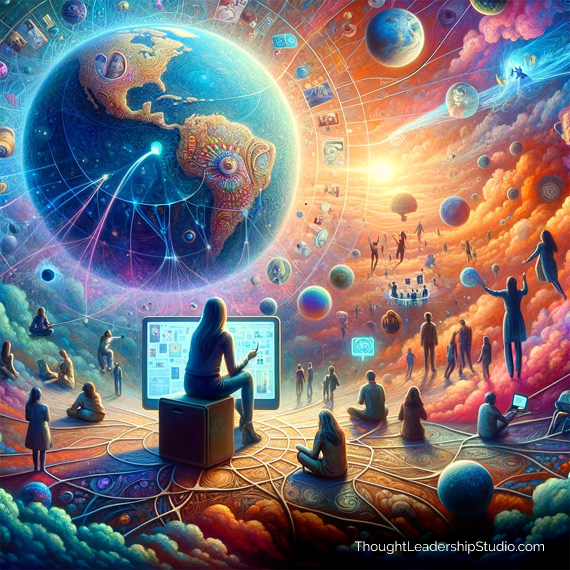 And I had to keep and learning and learning. So I was that person that didn't understand social media. But what happened was I was lonely. I was lonely. Don't forget, I was separated. My marriage had just broken up. The kids had gone to bed. I was sitting in my pajamas nine o'clock at night. I'm not mad about TV really.
And I had to keep and learning and learning. So I was that person that didn't understand social media. But what happened was I was lonely. I was lonely. Don't forget, I was separated. My marriage had just broken up. The kids had gone to bed. I was sitting in my pajamas nine o'clock at night. I'm not mad about TV really.
Well, I just eat when I'm watching tv, so I try not to watch tv. And so when I was on the computer, I found that I was able to do my work and get my orders out and stuff like that. And then I felt, hang on, I can find other people like me now with this computer thing. I can actually find other business owners. I can find other people in this business, the facts of life business.
I made connections all over the world with nurses and doctors, and I even had some of them, and I even interviewed some of them. So I started getting the stories, the real stories. Actually, this is a great story. I knew a friend of mine, he was a widower and he had three girls, but he was a poet, really good writer, really good with words, and really brilliant.
So I asked him would he do a guest blog on my website about his experience being a father of these three young girls. When his wife passed away, she had cancer. She passed away when she was young, and he was left with these three girls, and he had to go to the supermarket and buy the supplies for his girls. So I got his side of the story. I published the story on the blog, and because he's so good with words and he's a poet, it was a lovely, lovely blog.
What happened was I put it on Twitter and a researcher from a top radio show over here in Ireland reached out to me and asked could they get him on the show? So she got her guest. The show got their controversial topic of interest. I got some free marketing, and my friend had a new poetry book coming out, so he also got some advantage of it. So four people benefited from that thing. So that's another way I saw the power of actually telling stories and getting real stories out there because it was just so lovely and so articulate the way he told it. And it was really nice. So it was a really popular slot. So yeah, so really it's about thinking of me when I started out. And I know I always wanted to be the woman that I needed to meet when I started my business.
Chris McNeil: So you see yourself in your audience.
Samantha Kelly: Yeah.
Chris McNeil: And that's powerful.
Samantha Kelly: That was a long-winded answer to that question.
Chris McNeil: It's a powerful answer and it speaks to me on a number of levels. I don't know if we really all appreciate the magic that the internet allows now through social media to make these kinds of connections.
The Magic of Social Media: Transforming Connections into Real-World Impact
To go back to 2005, who would've imagined, and that maybe the business owner 2005 was thinking, "How do I get in touch with an audience without spending tens of thousands, hundreds of thousands of dollars a month on advertising to compete with the big players", but then the same person 15 years later, 20 years later, coming now might be like, oh, it's really hard to make time to get on the computer and to do the posting I need to do, because they don't always see the magic in it the way you do.
Samantha Kelly: Yeah.
Chris McNeil: I really appreciate you sharing that magic.
Samantha Kelly: Oh, you're welcome. I always call it Twitter magic, but now, I dunno what I'm going to call it. It's changed to X, but I just feel that I really am passionate about out passing on that knowledge as well and sharing knowledge and assisting others. So many, actually, there's no coincidences, sorry, there's serendipity has played a big part in my journey. I've met so many people that I've a lot of silent cheerleaders. Those silent cheerleaders that are watching and that are egging you on. Because I did come across a bit of begrudgery and a bit of negativity, and I did a TEDx about it actually, that people, I was starting to get people saying, oh, who does she think she is?
And well, Tweeting Goddess said, and then I went, hang on, I can just block these people. This is brilliant. This is great. So I just blocked Block, block. And then I also kind of said, I don't want these people in my life. I love the saying, don't ever take criticism from someone you would never go to for advice. I love that. And I think everybody should just have that up on their wall because I think we worry too much about what people think of us. I don't care anymore. But that could be age as well, like I'm 52, but I do find that there's lots more to be done.
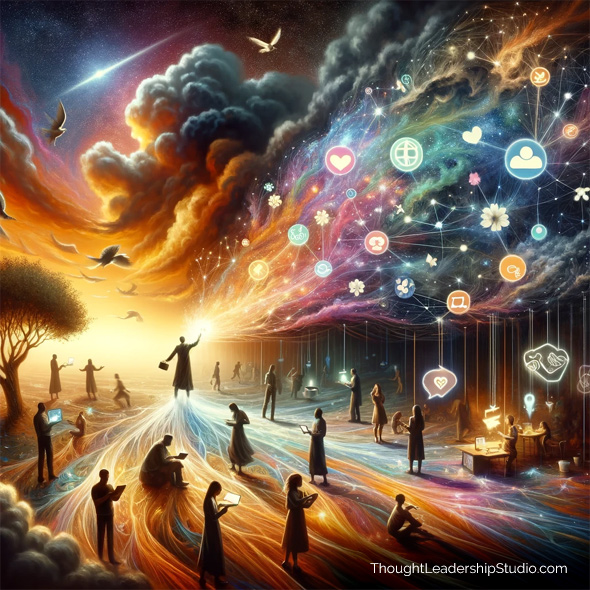 And I think the negativity that people hear about social media, they don't realize the actual power of connecting with someone in a different country that you would never, ever, Chris, we could actually probably meet in real life at some stage. You could be at a conference that I'm at, or you could come to Ireland or that can happen.
And I think the negativity that people hear about social media, they don't realize the actual power of connecting with someone in a different country that you would never, ever, Chris, we could actually probably meet in real life at some stage. You could be at a conference that I'm at, or you could come to Ireland or that can happen.
It's happened already for me. I have met people if I'm going to New York, I'm going to New York in June. If I'm going to New York, I have followers in New York. I actually met up with them for a cup of tea when I was there. That's great.
And I actually make the effort and go and let these people know, look, I'm going to be in New York. Do you want to meet for a cup of coffee? And a few of us would meet together, and it's just really nice. And that's the power, the positive power. And also, there's so many movements and so many people that need help. And I mean, I see it on TikTok as well. The amount of people that would donate money to a cause or something like that, or GoFundMe or a crowdfunding campaign. You can change lives. You really can.
Chris McNeil: Isn't it interesting how thought forms through the internet can take on a positive viral quality and kind of take on a life of their own, like a memetic entity through being able to be transmitted from person to person on large scale like that? And maybe that's how we make the world better. Maybe that's how we create social change.
Samantha Kelly: I don't think there's any maybe about it. I think it is totally possible, but you need good leaders like us that good leaders that actually believe and are passionate and want to genuinely help others. And it's the genuine thing, and it's the not what's in it for me kind of attitude. And I see a lot of that around in business, what's in it for me?
And I do do a lot of giving back, but I think the word spreads about that, that when you do help others, people talk. The world is quite small. And people talk. And I remember one particular, another story, I've only got a few minutes left, but another story. There was this crowd of women and there were meeting, and this is in a different county, and my name came up and this one started bitching about me and saying, oh no.
And then this other girl was there who, a month ago, a month before that, she had been in hospital with her son. She was a single mother and she was in hospital with her son. And I know how expensive it is to be in hospital with a child because you're buying snacks, you're buying pay for parking, and maybe you had to buy extra clothes.
And so I sent her a hundred Euros through PayPal, and I just look, go on. I know what it's like. And I sent her that. Now, I never said that in about that since that was between me and her. But wasn't she at that table when that conversation was happening? And she went, well, actually, wait until you hear what Samantha did for me. And then the whole table heard that story, and then the other girl looked really bad.
Chris McNeil: Well, that's the thing about social media. People worry about their detractors, but if you had no detractors, it wouldn't be such a strong reason for your supporters to come out in your favor to counter.
***************************************
The transcript is lightly edited for clarity and is a partial transcript- the full interview is on audio. Click here to listen.
***************************************
Free Stuff and Offers Mentioned in Podcast
***************************************
***************************************